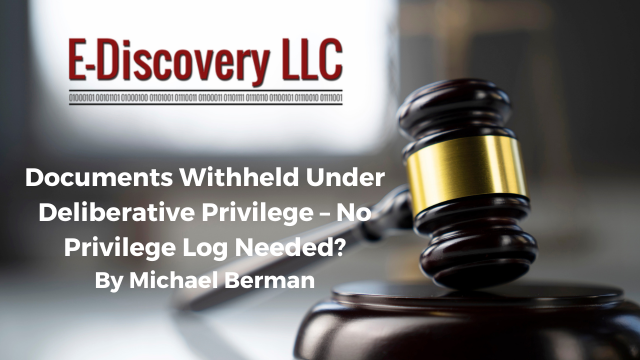
[EDRM Editor’s Note: The opinions and positions are those of Michael Berman.]
In Blue Mountains Biodiversity Project v. Jeffries, 99 F.4th 438 (9th Cir. 2024), the court held that, with one undefined, possible exception of “bad faith or improper [administrative agency] behavior,” an administrative agency withholding documents under the deliberative privilege need not provide a privilege log to a party seeking judicial review of the agency’s decision. Essentially, the court held that administrative review is “on the agency record” and the deliberatively privileged documents were not part of that record. Therefore, they need not be disclosed on a privilege log.
In Blue Mountains Biodiversity Project, the court addressed an issue of first impression in that circuit. It agreed with the D.C. Circuit that deliberative materials are not part of the administrative record and therefore an agency withholding materials under a “deliberative privilege” need not provide a privilege log.
Michael Berman.
It is fundamental that, in standard litigation, a litigant withholding documents as privileged must provide a privilege log. For example, under Fed.R.Civ.P. 26(b)(5): “When a party withholds information otherwise discoverable by claiming that the information is privileged or subject to protection as trial-preparation material, the party must: (i) expressly make the claim; and (ii) describe the nature of the documents, communications, or tangible things not produced or disclosed–and do so in a manner that, without revealing information itself privileged or protected, will enable other parties to assess the claim.”
The basic concept of a privilege log is “trust, but verify.” Please see Privilege Logs: New Techniques to Achieve Proportionality – The “Certification Log” (Mar. 4, 2024).
However, the Ninth Circuit held that that concept is inapposite to judicial review of an agency’s action. It is likely limited to that procedural context: “Our holding rests on two well-settled principles governing judicial review of agency action under the [Administrative Procedure Act].” Id. at 444.
In Blue Mountains Biodiversity Project, the court addressed an issue of first impression in that circuit. It agreed with the D.C. Circuit that deliberative materials are not part of the administrative record and therefore an agency withholding materials under a “deliberative privilege” need not provide a privilege log.
The Ninth Circuit noted that “the deliberative process privilege shields from disclosure documents reflecting advisory opinions, recommendations and deliberations comprising part of a process by which governmental decisions and policies are formulated.” Id. at n. 4 (citation omitted).
As to the privilege log, the court stated two general principles:
Blue Mountains Biodiversity Project v. Jeffries, 99 F.4th 438, 445 (9th Cir. 2024) (Cleaned up, emphasis added).
- Because deliberative materials are not part of the administrative record to begin with, they are not required to be placed on a privilege log.
- But whether materials are in fact deliberative is subject to judicial review, and in appropriate circumstances district courts may order a privilege log to aid in that analysis. For example, we agree with the D.C. Circuit that a showing of bad faith or improper behavior might justify production of a privilege log to allow the district to determine whether excluded documents are actually deliberative.
On the facts presented, the Blue Mountains Biodiversity Project court wrote:
BMBP does not assert any misconduct by the [administrative agency], nor does it contend that specific documents were improperly classified as deliberative. Although we leave for another day a detailed exploration of the precise circumstances under which a district court can order the production of a privilege log, the court here did not abuse its discretion by declining to do so in this case.
Id.
Rehearing en banc was denied. In an opinion disagreeing with the denial, four Judges wrote:
The panel’s holding in this case permits government agencies to sanitize the record available to reviewing courts, thereby severely curtailing meaningful judicial review of administrative action…. This court has long held that the “whole record” consists of all documents and materials considered by the agency before making its decision…. In keeping with our precedents, the Supreme Court has never “limit[ed] the ‘full administrative record’ to those materials that the agency unilaterally decides should be considered by the reviewing court…. In conflict with our case law, the decision here holds that materials protected by the deliberative process privilege are not part of the “whole record” for purposes of judicial review under the APA…. According to the panel opinion, because deliberative documents are—says the panel—not part of the “whole record,” the government ordinarily need not prepare a privilege log indicating the basis for excluding “deliberative” documents as privileged…. Under the opinion, absent a showing of bad faith or impropriety (or perhaps some other exception, not articulated), the government may routinely and unilaterally withhold all documents it deems “deliberative” without providing any account to the court or the litigants of the basis for excluding those documents. That holding is not only wrong but is likely to reduce APA review in many instances to a charade.”
Id. at 450-51 (cleaned up).
Those judges defined the “whole record” to include “everything that was before the agency pertaining to the merits of its decision.” Id. at 452. They wrote:
Our Circuit law is clear that, given that judicial review is limited to the administrative record, the administrative record must be complete. If the record is not complete, then the requirement that the agency decision be supported by “the record” becomes almost meaningless.
Id. (cleaned up).
The dissenting judges concluded: “The opinion sets a new baseline in which the government need not justify its claims of privilege except in limited circumstances, as yet unexplained. Without a privilege log, however, governmental mistakes or misconduct are unlikely to come to light.” Id. at 455.


